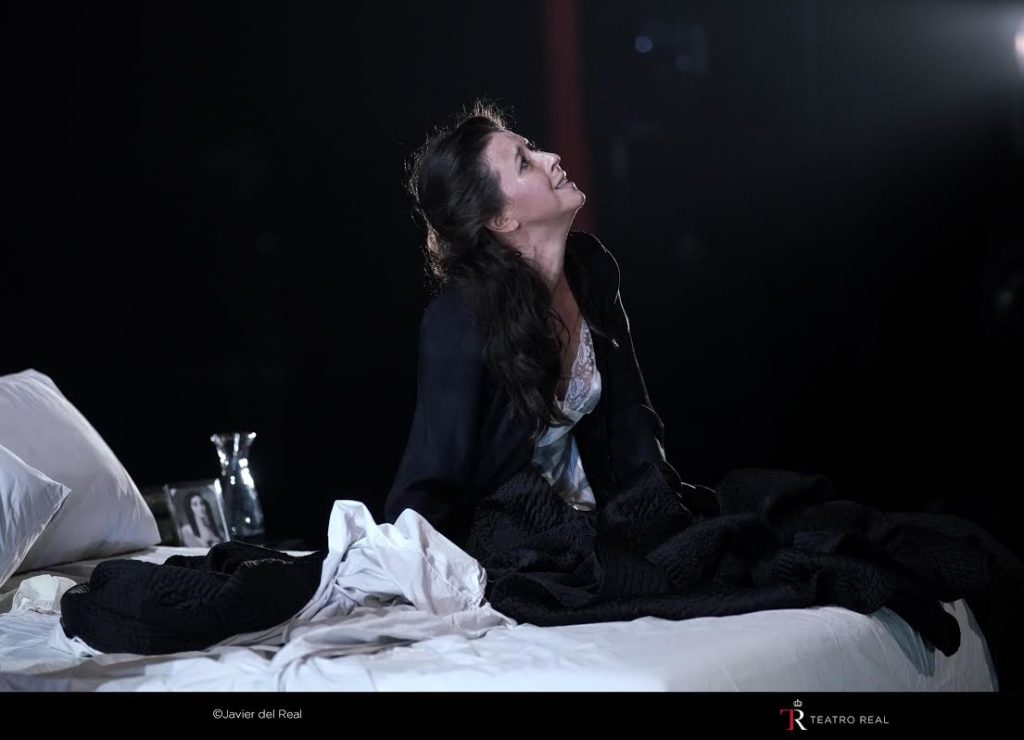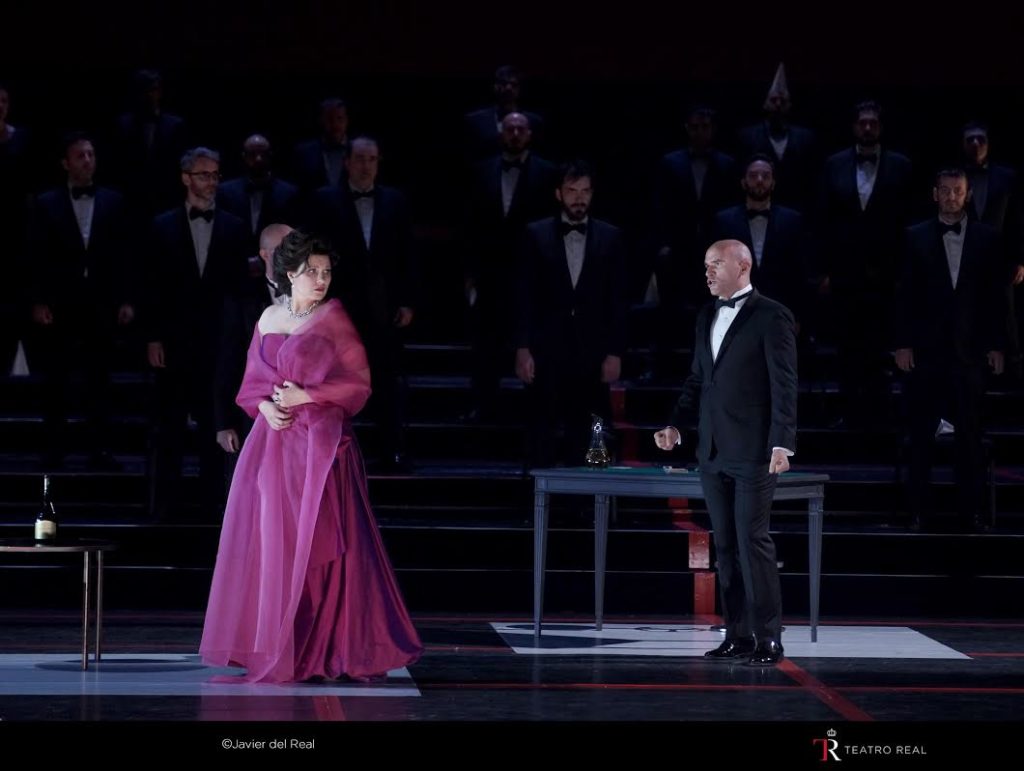
Roundtable: Marina Rebeka, Lisette Oropesa, Michael Fabiano, Matthew Polenzani, Artur Rucinski on Teatro Real de Madrid’s ‘Traviata’
By Mauricio VillaAt the beginning of July, the Teatro Real de Madrid kicked off a project that many other opera houses around the world observed attentively.
The company launched a production of Verdi’s “La Traviata” with some of the world’s greatest opera stars, presenting the work 27 times over the course of an entire month. That production’s run came to an end this past week with the company announcing that it came off without a hitch. In sum over 22,000 people saw the opera during that time and the company was also able to broadcast one of the performances worldwide.
Opera Wire talked to several leading singers during the performances of “La Traviata” at Teatro Real, getting an opportunity to understand the circumstances that took place to enable this monumental feat.
OperaWire: How did you react when Teatro Real phoned you to let you know that “La Traviata” was finally happening?
Marina Rebeka: It was great, amazing. You see, when this situation happened, I was sitting home and it thought it would be a week-long situation but it then became months and I had this idea that the world that we knew was vanishing.
Then I decided to take profit from the situation and do all the things I couldn’t do in my previous time. For example I became a proper mother and helped my child with home schooling and homework, with her music practice: solfeo and piano lessons. I started cooking with the help of my husband, as I am a terrible cook. And finished some details of my apartment I had never had the time to do like small furniture, curtains. And it was easy to do because Latvia was never totally closed down, we didn’t even wear masks and we have dealt very well with the situation.
Then as all my work was in the air, and we usually have everything planned three years ahead, I started working on two CD recordings, and studying new roles. I turned down five digital concerts because for me the real sense in singing is a live performance and not singing for an empty hall and a camera. Also I don’t specially like the filming. The final result depends so much on the make-up, the TV operator, the light…I mean you can look 20 years older if the light is wrong.
So then, I got this phone call from Teatro Real and I had to move my recording plans. Then coming to Madrid felt like if we were in war times when you need all this special permission, and wearing masks, and everyone was in a very strange mood.
Michael Fabiano: I was relieved! But I also felt great pride because I know Joan Matabosch to be a strong man and very courageous, and he was doing a courageous choice ahead of other people. He is very creative and forward-thinking, and that is the reason that I like to work for Joan Matabosch. He is willing to put the chips on the table. He is willing to play the game. He knows that art is at stake if we don’t get to work and get to business, and he had a way to make it happen with safety, health, and the right protocol. And he did it, and I felt an immense amount of pride.
Artur Rucinski: These performances were actually planned for April and May, and then I had “Lucia” in Covent Garden. But as the global locked down happened, everything got cancelled and I obviously understood. And I cannot say I complained because the last months had been crazy and I have traveled so much, so at last I could spend some quality time at home with my family and be a real father.
But after three months I was dying to be back on the stage. I have been making some recordings and streaming concerts, but it would never be the same as a truly live performance. So, when I received the call that the production was finally happening, I was more than happy. And this is something historical as they are giving an example to the rest of the world that you can do art with this COVID situation. Because here, at Teatro Real they are offering a performance of “Traviata” everyday, as there are four casts. Also, this theatre is supporting these artists who were workless for months.
I am in a good situation where I can support myself and my family without working for quite some time. But for the artist that depends on the monthly contracts because they are at the beginning of their careers it is a catastrophe as they received no support from the government.
But Teatro Real is showing that is possible, they accomplished all restrictions, and no one has been infected during the rehearsals of performances here in Madrid. We are so happy to be back on stage and the audience as well, fans come to meet us every night after the performance and express how grateful they are to be back at the theatre and enjoy real live singers, rather than on screen, computer or TV. This should never replace a real performance and I feel so sorry for my colleagues who are sitting at their homes in real trouble.
Lisette Oropesa: At first I was afraid, I was petrified! No really. Literally. I was not sure that the summer would be soon enough to travel to Europe and get back into the theatre. The Teatro Real informed me that it would be far from the normal type of production we were all used to doing. They reassured me all the measures that were taking place, and all the precautions they were following strictly. And in a way, I was right, the summer was too soon to travel, for Americans.
I’m fortunate to hold dual citizenship and thus be able to travel to Spain using my Spanish passport. It was scary flying for the first time in months. But the airlines have been pretty good about reassuring us that the air gets cleaned and recycled and that everyone is obligated to wear masks. Still, it felt like flying for the first time. I haven’t been around groups of people in months! We have been in pretty constant isolation since March, both at home in Baton Rouge, and in an apartment we rented in Santa Fe. So that was my main “reaction,” I guess you could say.
Upon our arrival in Europe, I felt more at ease to see the vast majority of people, even on the streets in 90+ degree weather, wearing masks and not making a fuss about it. In stores, 100 percent of people. It’s much more accepted and practiced and I can’t say the same for the US. When we were driving through Texas and Louisiana to get to New Mexico, any rest stop or gas station was full of people not wearing masks, except the employees, and this made us feel very apprehensive. So I’m glad to be in an environment now where the practice is not only encouraged, but voluntarily followed.
Matthew Polenzani: I had a huge amount of surprise, because I did not expect it to be possible, especially considering how bad things have been in America and also in Madrid. And I thought: “How is it even possible?”
Even after two conversations with my agent and Joan Matabosch where they explained to me all the extreme measures they were taking to perform, I still believed it would not be possible. I had a little bit of fear about being on a plane and being on stage with the chorus, and my colleagues in a closed building, as they were saying that closed places would make the infection more possible.
But once I fully understood all the precautions that the theater was taking, I was okay. The other issue was convincing my wife. She was so scared. She did not want me to do it. It was not a question of being in Madrid. I mean, right now I don’t feel safer here that I would be in New York or somewhere else. It was about what would happen while being on stage. But it took get a couple of days to settle down about the whole idea.


(Credit: Javier del REal)
OW: How do you feel about performing a semi-staged version with restrictions of movement and contact?
Marina Rebeka: Working with Leo Castaldi was amazing, because he was so flexible and let every Violetta of the cast act in their own way. It’s great because it gives you the opportunity to express the role as you feel it. But the last act was hard with this huge bed and not being able to embrace. The idea that worked for me was that from this point and within two meters there is death. So if you reach out your hand and you touch the other person, you will die. And during the last act, you realize you are responsible for the people around you.
It was hard, but on the other hand I had to make it work and make it emotional. But there was a moment through rehearsals and performances that during the second act the understanding with Artur / “Germont” was so strong that just looking into our eyes we knew which direction we were gonna take so we could move freely but keeping the safe distance. And right now I have a clear idea of what two meters are without looking at the marked squares on the floor. It was hard for me also during the bows of not being able to hold your colleague’s hands.
But after all, it is not important, because people who are coming to the performances are not afraid to come. They want to forget about their lives and enjoy the arts, and the circumstances are different. And the thing is we don’t know who the virus hit; some people get sick while others don’t. And I strongly believed that the mood of a person helps, and there are studies which says so, therefore I would say: come to the opera, so your mood will change and you will be safer.
But being serious, we are imposed which music to hear. You go shopping and you are forced to listen to music that you maybe don’t like, and it is always the same kind of commercial music. But who decides that? Why is there no support for opera or classical music in general? One good example is Japan, where I found Haydn being played in a big shopping mall or in the lobbies of the hotels. But Japan is a very crowed but organized civilization, so they choose classical music to help them calm down and keep order. In fact, there is a Japanese scientist Masaru Emoto who found out that the molecules of water, when they freeze tend to change their shape according to the music they listen to, and humans are 90 percent water, which proves that classical music in general does affect our bodies, not only in our moods but our health also. So this , I believed should be the future.
Once this knowledge is admitted worldwide and people think, “I need to go to the opera or musical concerts because I need to improve my health.” That’s why what we are doing at Teatro Real is so important, because we are giving normality, a chance to people to enjoy live art again, and in my believe, a chance to help the virus by changing people’s mood.
Michael Fabiano: I wouldn’t like it in normal conditions because obviously singing “Traviata,” the one thing I couldn’t do on stage is show that I am an emotional man and connect well with Violetta in a way I normally would. It is something that really belongs to you and that actually blocked a little bit of my performance. Because something that I care very deeply when I perform on stage is to have personal and physical connection with my colleagues. I know how to relate to people and I think that it means something not only to my colleagues but also to the audience. And because I couldn’t do that there was a small block in my personal characterization of the role, so I maybe looked colder than I would normally be as Alfredo, to be really honest. But considering the environment we were in it was totally correct. We were able to create a beautiful show, especially for Violetta, the chorus and the orchestra, and I am just very proud to be part of it.
Artur Rucinski: Well, this title is in fact a great idea, because it talks about a dangerous contagious illness which was Tuberculosis, so we can find a true parallelism with the current situation. And we can use the restrictions in our favor, as we have to keep always a two meters of distance and cannot touch each other. So we had to look for different ways of expressing our feelings to the audience. It is always, of course, harder for the characters of Violetta and Alfredo who have to play love scenes. So we have to focus on showing more emotion through our voices than the theatrical side. But after a twenty years career I felt like a beginner coming back from the quarantine, even if I have kept on singing all this time. But I am so happy that Joan Matabosch and all the people of this theatre made this possible.
Lisette Oropesa: As for the operatic experience, well it has been more tricky. We had a brief layout rehearsal onstage, where we learned the do’s and don’ts of the production. I had a full musical rehearsal with the conductor, who I must say is so very energetic and supportive. Nicola Luisotti. Amazing.
Stepping out onstage for the first time to perform was surreal. To see my colleagues when I was walking out there and do my best to make music with them was beautiful but also a bit challenging. They all have to stay two meters away and this makes the intimate connections difficult to establish. I can only really see them out of the corner of my eye, or turn in profile or upstage to look at them. It has been more of a mental journey for Violetta in this case. We are taking the idea of “social distance,” and “isolation” and making it the absolute theme of the production. In a way, it hits closer to home than I think many of us realize! She WAS sick, with a very contagious disease. She WAS isolated. It is beautiful to interpret this role in any setting, and this one is particularly memorable.
My favorite choice that we are making is that at the end, she doesn’t collapse and die as we traditionally see Violetta do. She dies and walks into the light, which I think highlights our need for hope in this difficult time. So many of us have literally lost loved ones suddenly to this terrible virus, and to see a tragic ending to Violetta staged that way would have been harrowing…so Leo Castaldi opted for the optimistic staging, that has Violetta swamped in a tunnel of light, as she passes into the next realm.
Matthew Polenzani: Well, it is very difficult for me to portray a love affair without physical contact, and this is really the main idea that we have to let go of. We have to feel that two people are in love with each other, although they cannot kiss, or hug or touch. And it is challenging, at the very beginning above all, when you have the love duet. You are supposed to be seducing and captivating Violetta with this idea of love that has been growing inside you for one year, when you are standing two meters away in one place. And I miss it at the end when I wish he could hold her during “Parigi o Cara.”
But for the time right now, this works, as we played with the idea that Violetta does not want to get anyone around her sick, and it feels real. And so far, I am lucky nobody in my family has been sick, but everyone knows someone who has been, so the socially distanced production is challenging but it works.
I saw one performance of the first cast and even if it is not the same it works. The best part is that music is alive, emotion, love, soul….it is all here, and we as humans we need music, and this interaction with live orchestra, and not only opera, but Broadway and plays. And the CDs, and broadcasts and HD, thank God we have them, but they are not the same.


